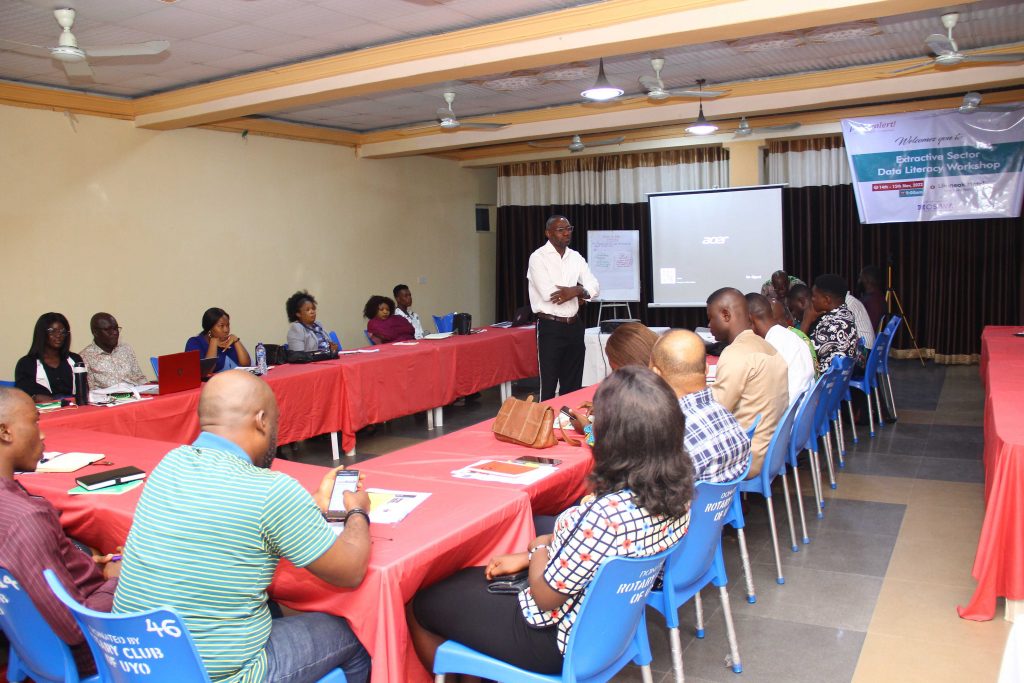By Jonathan Ugbal
Journalists, civil society organizations, and community actors in four states of the Niger Delta region have identified the utilization of beneficial ownership information and data as the panacea for the opacity attributed to the Nigerian extractive sector.
The sector comprises the oil and gas subsector and the solid minerals subsector. And, civic space actors from Akwa Ibom, Cross River, Delta, and Rivers States were gathered in Uyo, the Akwa State capital by Policy Alert for a capacity-building workshop on tracking beneficial ownership data on Nigeria’s oil swap deals where they were charged to utilize publicly available data in their advocacy for transparency in the sector.
“Before now, contracts and ownership information was shrouded in secrecy and that gave rise to shady and corrupt practices,” Tijah-Bolton Akpan, the Chief Executive Officer of Policy Alert told the gathering in his opening remarks.
He expressed optimism that the workshop will help guide journalists in their reportage of the sector. At the same time, community actors can better understand who to take their advocacy on issues of environmental degradation, local content and other matters to.
For Kazeem Lameed, the Team Leader, Communications, and Advocacy of the Nigerian Extractives Industry Transparency Initiative, NEITI, said the workshop was vital in ensuring that people really understood what the numbers churned out by the extractive industries meant.
In his presentation, he explained entry points for advocacy by civic space actors using reports published by NEITI and other reporting platforms.
In a similar vein, Auwal Sani Ibrahim Esq. staff of the Corporate Affairs Commission, explained that the current Company and Allied Matters Act, CAMA 2020, was an upgrade from that passed in 1990 as section 119 makes it mandatory for persons with significant control to be listed and filed to the commission with the commission having the powers to fine erring companies.
However, he lamented that out of about two million registered companies, less than 20 percent have implemented the law. He also explained that new companies cannot escape the provision and schooled participants on different aspects of the commission’s website interface.
Mr. Charles Mba, a journalist with Dataphyte, noted that a media house that utilizes infographics as its primary means of disseminating information taught attendees different means of collecting data, cleaning it, analyzing it, and publishing the same for different purposes.
He tasked civic space actors not to get too comfortable and continue probing data and simplifying it for different categories of people.
Furthermore, the Senior Program Officer of Policy Alert, Mfon Gabriel took the attendees on early insights and findings from the beneficial ownership data use project by Policy Alert and what they had discovered while kelechukwu Ogu, a journalist with Premium Times shared insights on ways to investigate oil swap deals in Nigeria.
Armed with the skills learned, attendees are expected to help push the call for a more transparent extractive sector in the country especially as it contributes over 70 percent of Nigeria’s export earnings and revenue.
Since You Are Here, Support Good JournalismCrossRiverWatch was founded on the ideals of deploying tech tools to report in an ethical manner, news, views and analysis with a narrative that ensures transparency in governance, a good society and an accountable democracy. Everyone appreciates good journalism but it costs a lot of money. Nonetheless, it cannot be sacrificed on the altar of news commercialization. Consider making a modest contribution to support CrossRiverWatch's journalism of credibility and integrity in order to ensure that all have continuous free access to our noble endeavor. CLICK HERE |
New Feature: Don't miss any of our news again.Get all our articles in your facebook chat box.Click the Facebook Messenger Icon below to subscribe now
Text Advert by CRWatch :Place Yours
Will You To Learn How To Make Millions Of Naira Making Special Creams From Your Kitchen?.Click Here
Expose Your Business And Make More Sales. Advertise On CrossRiverWatch.com Today
